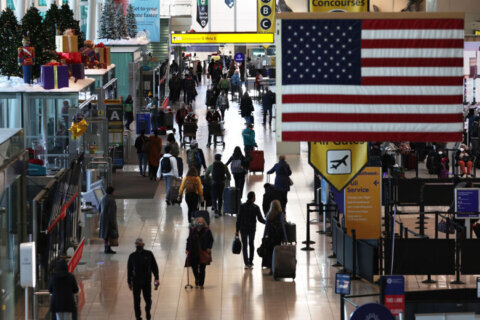This article was republished with permission from WTOP’s news partners at Maryland Matters. Sign up for Maryland Matters’ free email subscription today.
This content was republished with permission from WTOP’s news partners at Maryland Matters. Sign up for Maryland Matters’ free email subscription today.
Maryland Attorney General Brian E. Frosh (D) has rehired a high-level prosecutor to lead a probe of sex abuse in the Baltimore Archdiocese, Maryland Matters has learned.
Elizabeth M. Embry has been brought back to lead the state’s efforts to locate victims, identify the church leaders who perpetrated the alleged abuse, and determine whether bishops and other high-ranking officials sought to shield predatory priests.
She served as head of the AG’s Criminal Division until last spring, when she left the office to run for lieutenant governor on a ticket headed by then-Prince George’s County Executive Rushern L. Baker III (D).
In addition to hiring Embry, budget documents prepared by the Department of Legislative Services (DLS) show that Frosh is asking the General Assembly to approve funding in fiscal year 2020 for two new assistant attorneys general “to support the investigation.” A spokeswoman for Frosh says the DLS analysis is inaccurate.
The attorney general’s investigation follows the release, last August, of a scathing report by Pennsylvania Attorney General Josh Shapiro (D). His two-year investigation into sex abuse by Catholic priests captured “widespread sexual abuse and institutional cover-up across the entire state,” according to the document.
Reached by phone on Tuesday, Embry confirmed that she has returned to the attorney general’s office, though she refused to confirm details of her role or describe the size of her investigatory team.
“I’m very happy. It’s a wonderful place to be,” she said. “I’ve always loved it here.”
In January, Frosh announced that a hotline has been established for people who have been sexually abused by priests, but he has steadfastly refused to confirm the existence of a probe. The announcement was made via press release, not at a news conference.
The budget documents prepared for the General Assembly may be the first official confirmation that Frosh’s office has launched an investigation similar to Pennsylvania’s. They show that the attorney general’s office is seeking to hire two assistant attorneys general “to support the investigation into the Baltimore Archdiocese.”
Frosh’s spokeswoman, Raquel Guillory Coombs, called the budget analyst’s language “incorrect.”
“We have notified DLS that it is incorrect,” she said in an email. She offered no explanation for why the language describing the new positions has been online for weeks if it is in error.
Overall, the DLS analysis shows the Attorney General’s office seeking 13 new hires – including six to work on housing issues and four assistant attorneys general to work on opioid interdiction. The funding for those hires would be offset to a degree by the fact that the AG’s office is eliminating eight long-vacant positions.
A lawmaker who has emerged as a leader in the General Assembly on sexual abuse issues said Frosh’s actions are not enough.
“That isn’t even close to sufficient,” Del. C.T. Wilson (D-Charles) said.
“I still believe, because of the massive amount of information from Pennsylvania and the fact that we are a Catholic state, that there needs to be more done. He’s going to need more people.”
In explosive testimony before a legislative committee in 2015, Wilson disclosed years of abuse he said occurred at the hands of his adoptive father.
He said he has spoken to Frosh about the need for more additional resources to investigate sexual abuse, and has offered to work with Gov. Lawrence J. Hogan Jr. (R) if that’s with it takes.
“My worry, as I told him, is two-fold — that they don’t have enough people and not enough people know that this investigation is on-going.”
Wilson is sponsoring legislation this session to remove the statute of limitations on abuse claims. Advocates for people abused as children say it can take decades to come to grips with the horror of their abuse. Statutes of limitation frequently expire before victims feel strong enough to confront their abusers.
Wilson said he told Frosh that if he is serious about uncovering all the wrongful acts that occurred, the state must have a seasoned investigator in every county.
“We cannot continue to cover up these wrongs or do a half-assed job,” he said. “We’re either going to do it or we’re not. We’re not going to half-ass it and then try to take credit for our ‘hard work.’ We’re going to do it the right way.”
Victims “need to know the number to call, they need to know who to reach out to,” Wilson added. “You’ve got to have the notoriety so people know who to turn to. These stories need to be heard.”
The Baltimore Archdiocese covers nine jurisdictions in Central and Western Maryland. The Archdiocese of Wilmington, Del., covers the nine Eastern Shore counties. The Archdiocese of Washington, D.C., covers Montgomery and Prince George’s counties and the three Southern Maryland counties.
In Pennsylvania, a state approximately twice the size of Maryland, investigators identified more than 300 “predator priests who sexually abused children while serving in active ministry in the church.”
They also compiled “accounts of over 1,000 children,” although the real number of victims was believed by the grand jury overseeing the inquiry to be in the “thousands.”
The Pennsylvania investigation into six of the state’s archdioceses lasted two years and resulted in an 840-page report issued that generated weeks of national headlines. In 2005, a grand jury investigated the Philadelphia archdiocese, and in 2016, a grand jury empaneled by Shapiro’s predecessor, former attorney general Kathleen Kane (D), investigated the Altoona-Johnstown archdiocese.
In January, church leaders in Baltimore told reporters they had turned over 50,000 internal files to the attorney general’s office.
Archbishop William Lori described the clergy sex abuse scandal at the time as a “genuine crisis” and he said the Baltimore archdiocese is “working very hard to cooperate” with Frosh’s inquiry.
Wilson told Maryland Matters it will take more than a couple of people to go through 50,000 files and track down leads that come in from the state’s clergy sex-abuse hotline.
“This sounds like a daunting amount of information for one prosecutor and a few investigators to handle,” he said.
“So I told [the attorney general], if it’s money, whatever it is, you let me know, but either way, we have to publicize what’s going on so the rest of the state knows — so that regular people know — that they can come to you.”
Coombs said that “more than 100” leads have come in via the hotline and other sources in the nearly two months since the phone reporting system went live.
In the interview, Wilson challenged Frosh’s decision to keep the probe under wraps.
“A lot of investigations are done in the dark, because you don’t want the target to know that they’re being investigated,” he said. “I was a criminal attorney for 15 years. This is not one of those.”
In light of the budget language describing the need for new personnel and the establishment of a hotline, Embry was pressed about the AG’s continued secrecy.
“I understand all your points,” she told a reporter, “but I can’t talk about it.”
Victims of clergy sex abuse who wish to contact the Attorney General’s investigators can call 410-576-6312 or they can email report@oag.state.md.us.







